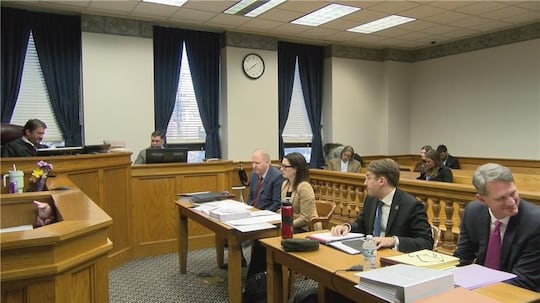Missouri
After backlash to March primary, Missouri lawmakers debate reversing 2022 election change

JEFFERSON CITY, Mo. (KFVS) – After this year’s presidential preference primary in Missouri, many voters are calling for state lawmakers to return the process to state control.
The 2024 election cycle was the first presidential primary to be administered by a party-run primary system after Gov. Mike Parson signed a 2022 law to shift the burden from state and local election officials.
“My sense is that the clerks obviously didn’t like having two elections within 30 days of each other because of some logistical concerns and evidentiary concerns if there are problems or audits,” Secretary of State Jay Ashcroft said. “There was also the concern about the cost.”
The cost to state and local governments of running the presidential preference primary was roughly $10 million, according to Ashcroft.
Additionally, the new system also allowed the individual parties to restrict participation to only registered members.
Missouri Republicans moved to a caucus system, where participants convene county-level party meetings to choose the candidate through either secret ballots or a public showing of support.
However, those meetings happen on one day in singular county locations, making participation and access far more challenging.
“The way this has played out [reveals] the caucus system really does disenfranchise voters,” said state Rep. Ben Baker, R-Neosho.
Baker is one of several lawmakers who have filed versions of a bill to reverse the 2022 change and reinstate the state-administered preference primary.
“I’ve probably had more complaints from constituents over this issue than anything that I’ve done – or not done – in the past six years,” Baker told the House Special Committee on Public Policy Tuesday.
The Democratic Party in Missouri organized a state-wide election for its march selection, but House Elections Committee’s ranking member, state Rep. Joe Adams, D-University City, said it was not as well-resourced as an election run by the state government.
“I would like everybody to have the opportunity to have a say in who the presidential candidate will be that they will vote for in November,” Adams said. “I want people to participate.”
With less than a month left in the legislative session, it’s increasingly less likely that this policy change will reach the governor’s desk for passage, but it’s also not a pressing deadline with two more sessions before Missourians would have to vote on another presidential candidate in 2028.
Copyright 2024 KFVS. All rights reserved.

Missouri
Jackson County voters sue over new congressional map after 305K petition signatures ignored

JEFFERSON CITY, Mo. (KCTV) – Two Jackson County voters filed a lawsuit to stop Missouri’s new congressional map from being used in the 2026 elections.
The ACLU of Missouri says the suit was filed in Cole County Circuit Court on behalf of Jake Maggard and Gregg Lombardi. Both are registered voters who live in Jackson County.
The lawsuit claims that Missouri violated voters’ constitutional rights. The state implemented the new map on Dec. 11 despite a petition with more than 305,000 signatures demanding a public vote.
“By attempting to enact the new maps despite receiving more than 305,000 signatures from Missouri voters demanding a referendum, the Secretary of State is denying a longstanding tradition, judicial precedent, and our constitutional rights,” said Tori Schafer, Director of Policy and Campaigns at the ACLU of Missouri.
What the lawsuit seeks
The ACLU said it wants the court to suspend House Bill 1. The organization has asked a judge to prevent election officials from using the new congressional map until voters approve or reject it through a referendum.
The lawsuit names Missouri Attorney General Catherine Hanaway and Secretary of State Denny Hoskins as defendants.
According to the suit, both Maggard and Lombardi live in Missouri’s Fifth Congressional District. Under the new map, they would be moved to the Fourth Congressional District.
The petition controversy
People Not Politicians submitted 305,000 signatures to Secretary Hoskins on Dec. 9, according to the ACLU. That is nearly 3 times the number required to force a public vote on the congressional map.
The ACLU argues that century-old court rulings say a referendum petition should immediately suspend a law, no verification required.
In 2017, then-Secretary of State Jay Ashcroft suspended Missouri’s right-to-work law after more than 300,000 signatures were received. His office had not yet verified the signatures or issued a certificate.
But Hoskins has taken a different approach. He said the new map will remain in effect until his office certifies the petition signatures. A process that could take until July 2026.
Timeline of legal challenges
The Missouri General Assembly approved the new congressional map on Sept. 12, 2025, during a special session.
Opponents wasted no time in filing legal challenges. By Sept. 15, 3 lawsuits had been filed along with the referendum petition.
Several lawsuits claim the redistricting process was unconstitutional. One lawsuit noted that a southeast Kansas City Voter Tabulation District was placed in both Congressional Districts 4 and 5.
The Senior Director for Redistricting at Campaign Legal Center told KCTV5 in September that this means the districts are no longer equally populated. However, Governor Mike Kehoe’s office said there was no error in the map.
On Nov. 12, Cole County Judge Christopher Limbaugh heard arguments over whether the General Assembly legally redrew the congressional districts.
On Dec. 12, court records indicated that Limbaugh suspended the case until the petition signatures are certified or rejected. He ordered Hoskins to preserve all signatures filed with his office.
In early November, AG Hanaway filed her own lawsuit against People Not Politicians. She claimed the organization was trying to take redistricting power away from the state’s General Assembly.
Missouri’s top Senate Democrat, Doug Beck, sent Hanaway a letter demanding she dismiss the case. Beck said she did not have the party’s consent to represent them in that way.
Ballot language dispute
On Nov. 13, Hoskins certified the official ballot title for the referendum question. The ballot language describes the old map as “gerrymandered” and says it “protects incumbent politicians.”
However, People Not Politicians filed a lawsuit on Nov. 20 that claims the summary statement is intentionally argumentative and creates prejudice.
The organization also argues that Hoskins is not authorized to draft a summary statement for a referendum.
A bench trial on this dispute is scheduled for Jan. 16 in Cole County.
What happens next
The court has not yet set a hearing date for Tuesday’s lawsuit.
The filing period for congressional candidates begins Feb. 24, 2026. However, with the new map in effect, they would file for the new congressional districts. This could create more complications if the map is overturned.
Missouri will hold primary elections in August and the general election in November.
Hoskins has until July 2026 to certify whether the referendum petition contains enough valid signatures. If certified, the question would go to voters in the November general election.
Hanaway and Hoskins have said they are ready to defend the redistricting in court.
Copyright 2025 KCTV. All rights reserved.
Missouri
Missouri Lottery Powerball, Pick 3 winning numbers for Dec. 22, 2025
The Missouri Lottery offers several draw games for those aiming to win big. Here’s a look at Dec. 22, 2025, results for each game:
Winning Powerball numbers from Dec. 22 drawing
03-18-36-41-54, Powerball: 07, Power Play: 2
Check Powerball payouts and previous drawings here.
Winning Pick 3 numbers from Dec. 22 drawing
Midday: 5-7-3
Midday Wild: 0
Evening: 1-1-5
Evening Wild: 0
Check Pick 3 payouts and previous drawings here.
Winning Pick 4 numbers from Dec. 22 drawing
Midday: 5-9-0-1
Midday Wild: 4
Evening: 0-3-8-5
Evening Wild: 0
Check Pick 4 payouts and previous drawings here.
Winning Cash4Life numbers from Dec. 22 drawing
07-12-22-25-27, Cash Ball: 01
Check Cash4Life payouts and previous drawings here.
Winning Cash Pop numbers from Dec. 22 drawing
Early Bird: 14
Morning: 09
Matinee: 12
Prime Time: 02
Night Owl: 10
Check Cash Pop payouts and previous drawings here.
Winning Show Me Cash numbers from Dec. 22 drawing
03-04-13-20-32
Check Show Me Cash payouts and previous drawings here.
Winning Powerball Double Play numbers from Dec. 22 drawing
14-32-47-48-69, Powerball: 17
Check Powerball Double Play payouts and previous drawings here.
Feeling lucky? Explore the latest lottery news & results
Are you a winner? Here’s how to claim your lottery prize
All Missouri Lottery retailers can redeem prizes up to $600. For prizes over $600, winners have the option to submit their claim by mail or in person at one of Missouri Lottery’s regional offices, by appointment only.
To claim by mail, complete a Missouri Lottery winner claim form, sign your winning ticket, and include a copy of your government-issued photo ID along with a completed IRS Form W-9. Ensure your name, address, telephone number and signature are on the back of your ticket. Claims should be mailed to:
Ticket Redemption
Missouri Lottery
P.O. Box 7777
Jefferson City, MO 65102-7777
For in-person claims, visit the Missouri Lottery Headquarters in Jefferson City or one of the regional offices in Kansas City, Springfield or St. Louis. Be sure to call ahead to verify hours and check if an appointment is required.
For additional instructions or to download the claim form, visit the Missouri Lottery prize claim page.
When are the Missouri Lottery drawings held?
- Powerball: 9:59 p.m. Monday, Wednesday and Saturday.
- Mega Millions: 10 p.m. Tuesday and Friday.
- Pick 3: 12:45 p.m. (Midday) and 8:59 p.m. (Evening) daily.
- Pick 4: 12:45 p.m. (Midday) and 8:59 p.m. (Evening) daily.
- Cash4Life: 8 p.m. daily.
- Cash Pop: 8 a.m. (Early Bird), 11 a.m. (Late Morning), 3 p.m. (Matinee), 7 p.m. (Prime Time) and 11 p.m. (Night Owl) daily.
- Show Me Cash: 8:59 p.m. daily.
- Lotto: 8:59 p.m. Wednesday and Saturday.
- Powerball Double Play: 9:59 p.m. Monday, Wednesday and Saturday.
This results page was generated automatically using information from TinBu and a template written and reviewed by a Missouri editor. You can send feedback using this form.
Missouri
Missouri Lottery Pick 3, Pick 4 winning numbers for Dec. 21, 2025
The Missouri Lottery offers several draw games for those aiming to win big. Here’s a look at Dec. 21, 2025, results for each game:
Winning Pick 3 numbers from Dec. 21 drawing
Midday: 9-5-2
Midday Wild: 3
Evening: 0-5-0
Evening Wild: 9
Check Pick 3 payouts and previous drawings here.
Winning Pick 4 numbers from Dec. 21 drawing
Midday: 3-4-0-7
Midday Wild: 0
Evening: 3-4-4-6
Evening Wild: 1
Check Pick 4 payouts and previous drawings here.
Winning Cash4Life numbers from Dec. 21 drawing
15-25-30-40-55, Cash Ball: 02
Check Cash4Life payouts and previous drawings here.
Winning Cash Pop numbers from Dec. 21 drawing
Early Bird: 01
Morning: 06
Matinee: 14
Prime Time: 01
Night Owl: 10
Check Cash Pop payouts and previous drawings here.
Winning Show Me Cash numbers from Dec. 21 drawing
04-07-13-22-32
Check Show Me Cash payouts and previous drawings here.
Feeling lucky? Explore the latest lottery news & results
Are you a winner? Here’s how to claim your lottery prize
All Missouri Lottery retailers can redeem prizes up to $600. For prizes over $600, winners have the option to submit their claim by mail or in person at one of Missouri Lottery’s regional offices, by appointment only.
To claim by mail, complete a Missouri Lottery winner claim form, sign your winning ticket, and include a copy of your government-issued photo ID along with a completed IRS Form W-9. Ensure your name, address, telephone number and signature are on the back of your ticket. Claims should be mailed to:
Ticket Redemption
Missouri Lottery
P.O. Box 7777
Jefferson City, MO 65102-7777
For in-person claims, visit the Missouri Lottery Headquarters in Jefferson City or one of the regional offices in Kansas City, Springfield or St. Louis. Be sure to call ahead to verify hours and check if an appointment is required.
For additional instructions or to download the claim form, visit the Missouri Lottery prize claim page.
When are the Missouri Lottery drawings held?
- Powerball: 9:59 p.m. Monday, Wednesday and Saturday.
- Mega Millions: 10 p.m. Tuesday and Friday.
- Pick 3: 12:45 p.m. (Midday) and 8:59 p.m. (Evening) daily.
- Pick 4: 12:45 p.m. (Midday) and 8:59 p.m. (Evening) daily.
- Cash4Life: 8 p.m. daily.
- Cash Pop: 8 a.m. (Early Bird), 11 a.m. (Late Morning), 3 p.m. (Matinee), 7 p.m. (Prime Time) and 11 p.m. (Night Owl) daily.
- Show Me Cash: 8:59 p.m. daily.
- Lotto: 8:59 p.m. Wednesday and Saturday.
- Powerball Double Play: 9:59 p.m. Monday, Wednesday and Saturday.
This results page was generated automatically using information from TinBu and a template written and reviewed by a Missouri editor. You can send feedback using this form.
-

 Iowa1 week ago
Iowa1 week agoAddy Brown motivated to step up in Audi Crooks’ absence vs. UNI
-

 Maine1 week ago
Maine1 week agoElementary-aged student killed in school bus crash in southern Maine
-

 Maryland1 week ago
Maryland1 week agoFrigid temperatures to start the week in Maryland
-

 New Mexico7 days ago
New Mexico7 days agoFamily clarifies why they believe missing New Mexico man is dead
-

 South Dakota1 week ago
South Dakota1 week agoNature: Snow in South Dakota
-

 Detroit, MI1 week ago
Detroit, MI1 week ago‘Love being a pedo’: Metro Detroit doctor, attorney, therapist accused in web of child porn chats
-

 Health1 week ago
Health1 week ago‘Aggressive’ new flu variant sweeps globe as doctors warn of severe symptoms
-

 Maine7 days ago
Maine7 days agoFamily in Maine host food pantry for deer | Hand Off


























